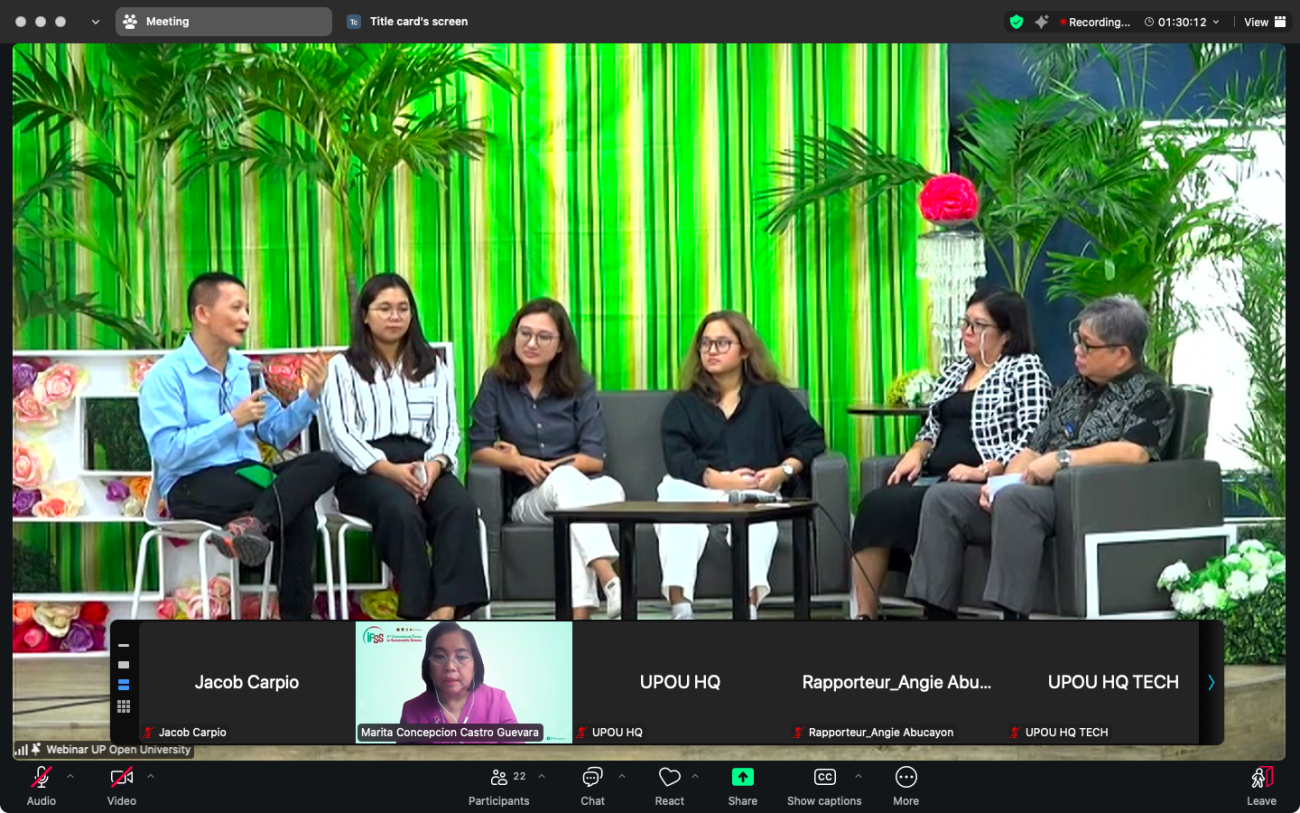Ateneo MICROCASA Team Participates in the 2nd International Forum on Sustainability Science (IFSS)
23 Jul 2024 | Christian F. Dasalla
BUTUAN CITY — The Ateneo delegation and team members of the MICROCASA project participated in the 2nd International Forum on Sustainability Science (IFSS) held at the Caraga State University Main Campus in Ampayon, Butuan City last 11 July 2024.
Organized by the University of the Philippines (UP) Open University, UP Office of International Linkages, and the UP Open University Foundation in collaboration with the Caraga State University, IFSS 2024 aims to pave the way for collaborative action with relevant stakeholders for sustainability. With the theme “Climate Resilience: Bridging Science, Policy, and Practice,” the forum hopes to shed light on how sustainability can be addressed in various sectors of society, including technology and digital transformation. For the forum's panel on Sustainability and Digital Transformation, the MICROCASA Philippine partners from the UP Open University and Ateneo de Manila University presented its Digital Workplace Competency Training (DWCT) pilot course as an effective case for looking at the effects of innovation and digital transformation on sustainability.
MICROCASA or Micro-credentials for Life-Long Learning and Employability: Building Capacities for Developing Agile Educational Interventions in Southeast Asian Universities is the first international project of Erasmus+ that aims to share European experiences by European nations in micro-credentials and build the educational capacities in Southeast Asian universities. This collaboration between the European Union and 6 Southeast Asian universities, including the Ateneo de Manila University and the University of the Philippines System, hopes to jointly develop, endorse, and provide brief competency-focused educational modules that lead to micro-credentials, all with the ultimate objective of addressing diverse economic and societal challenges.
At the forum, Dr. Dennis Batangan, Research Scientist at the Ateneo’s Institute of Philippine Culture-School of Social Sciences and MICROCASA Project Lead for Ateneo, shared a talk on the importance of micro-credentials as catalysts for labor upskilling in the digital age. Dr. Batangan presented micro-learning through what the project’s European partners describe as "learning nuggets" or a new approach to modular-learning courses and education which may be beneficial to the world post-pandemic. He emphasized that through MICROCASA, higher education institutions would become more responsive in creating systems to co-designing micro-credentials for the Filipino people.
Dr. Marita Concepcion Castro Guevara, Associate Professor of the Department of Interdisciplinary Studies and Research Associate at the Institute of Philippine Culture-School of Social Sciences, introduced the case of MICROCASA and its aim to empower higher education through capacitating universities and colleges for microcredentials. Dr. Castro Guevara presented a regional study on the perception of Southeast Asian higher education institutions (HEIs) on micro-credentials, highlighting the unanimous interest to learn more about micro-credentials, given its potential within the Philippine context. She also underscores that using micro-credentials is an avenue to address holistic development of learners in view of the Sustainable Development Goals (SDGs) for communities and societies, through SDG 4 (Quality Education), SDG 8 (Decent Work and Economic Growth), SDG 9 (Industry, Innovation, and Infrastructure), and SDG 10 (Reduced Inequalities).
During the open forum, Dr. Batangan and Dr. Castro Guevara, alongside co-panelists Dr. Joane V. Serrano, Ms. Sydney Rovin D. Macahiya, Ms. Dina Mae N. Rejano, and Ms. Janelle G. Ebron, discussed the challenges of bringing micro-credentials to the country given the complexities of the socio-economic and educational situation. With the advent of rapid technological adoption, internet connectivity, low network bandwidth, and the high cost of acquiring mobile data in the country serves as a significant issue that may impede learners’ experience of education. This is why, according to Dr. Castro-Guevara, online courses such as those offered under MICROCASA must support low resolution files and be interoperable across different portable devices, including smartphones. Despite this, a notable interest and demand for online courses remains, in light of the total count of learners taking online courses at UPOU reaching over 11,000, as remarked by Dr. Batangan.
As MICROCASA enters its second year of iplementation, the future of the educational landscape in Southeast Asia with micro-credentials and digital transformation is bright, especially in the Philippines. Through the collaborative initiatives between institutions, such as the UP System and Ateneo de Manila University, promising advancements may be expected in paving the way for improvements in the region's educational system.









